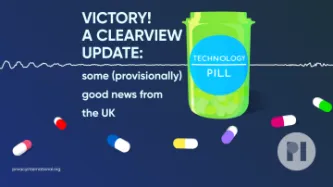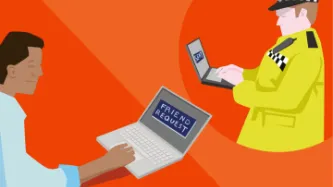Search
Content type: Long Read
Social media is now undeniably a significant part of many of our lives, in the UK and around the world. We use it to connect with others and share information in public and private ways. Governments and companies have, of course, taken note and built fortunes or extended their power by exploiting the digital information we generate. But should the power to use the information we share online be unlimited, especially for governments who increasingly use that information to make material…
Content type: Advocacy
BackgroundThe Snowden revelations and subsequent litigation have repeatedly identified unlawful state surveillance by UK agencies. In response, the UK Parliament passed the highly controversial Investigatory Powers Act 2016 (IPA), which authorised massive, suspicionless surveillance on a scale never seen before, with insufficient safeguards or independent oversight.Privacy International led legal challenges to this mass surveillance regime both before and after the Act became law. The Act…
Content type: Video
<br />
Links
Read more about the ICO's provisional decision
Support our work
You can find out more about Clearview by listening to our podcast: The end of privacy? The spread of facial recognition
Content type: Report
It is common for families with no recourse to public funds who attempt to access support from local authorities to have their social media monitored as part of a 'Child in Need' assessment. This practice appears to be part of a proactive strategy on the part of local authorities to discredit vulnerable families in order to refuse support. In our experience, information on social media accounts is often wildly misinterpreted by local authorities who make serious and unfounded allegations…
Content type: Examples
The risk detection company Dataminr has created an AI system that analyses social media posts to predict the next hotspots for COVID-19 outbreaks. The company claims it successfully predicted spikes seven to 13 days before they occurred - in the UK, in London, Hertfordshire, Essex, and Kent, and in 14 US states. Rather than measuring aggregated data, the system looks for unique posts from individuals who say they have symptoms, have tested positive, or been exposed, as well as first-hand…
Content type: Examples
The rise of social media has also been a game changer in the tracking of benefits claimants. In the UK in 2019, a woman was jailed after she was jailed for five months after pictures of her partying in Ibiza emerged on social media. She had previously sued the NHS for £2.5 million, after surviving a botched operation. She had argued the operation had left her disabled and the “shadow of a former self” but judges argued that the pictures suggested otherwise.
https://www.dailymail.co.uk/news/…
Content type: Long Read
(In order to click the hyperlinks in the explainer below, please download the pdf version at the bottom of the page).
Content type: Long Read
Disclaimer: This piece was written in April 2017. Since publishing, further information has come out about Cambridge Analytica and the company's involvement in elections.
Recently, the data mining firm Cambridge Analytica has been the centre of tons of debate around the use of profiling and micro-targeting in political elections. We’ve written this analysis to explain what it all means, and the consequences of becoming predictable to companies and political campaigns.
What does…
Content type: Press release
A new Twitter Bot, launched today by the global privacy rights organisation Privacy International, ‘reveals’ the internet browsing history of leading politicians, as well as details of their telephone, text message, WhatsApp, and even Snapchat communications. @GCHQbot has been launched to raise the profile of the sensitivity of our internet browsing history and communications data, on the day that the Investigatory Powers Bill begins its Committee Stage in the House of Lords.
Bot: …






